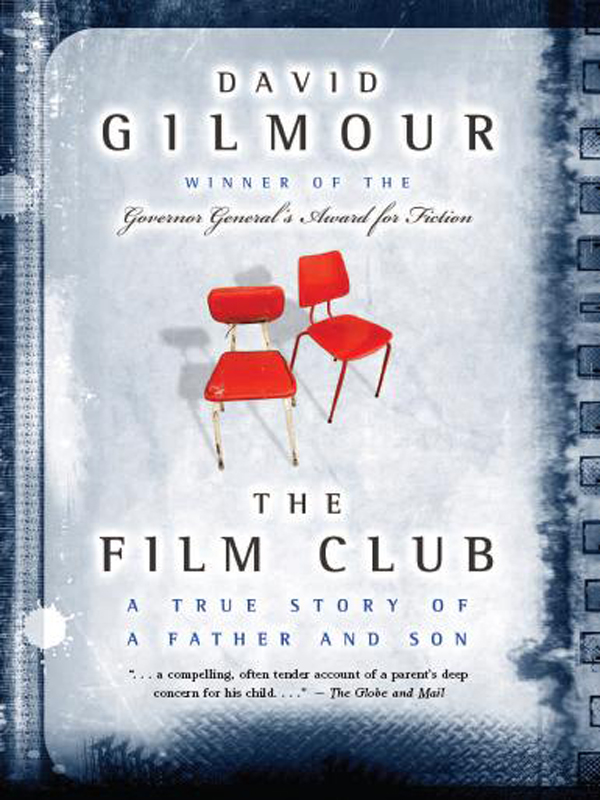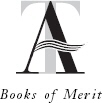The Film Club


David Gilmour is a novelist who has earned critical praise from literary figures as diverse as William Burroughs and Northrop Frye, and from publications as different as the
New York Times
to
People
magazine. The author of six novels, including
A Perfect
Night to Go to China
, which won the 2005 Governor General's Award for Fiction, he also hosted the award-winning
Gilmour on the Arts
. His books have been translated into 11 languages. He lives in Toronto with his wife Tina Gladstone.

The Film Club
OTHER BOOKS BY DAVID GILMOUR
A Perfect Night to Go to China
Back on Tuesday
How Boys See Girls
An Affair with the Moon
Lost Between Houses
Sparrow Nights
THE
FILM CLUB
A TRUE STORY OF
A FATHER AND SON

DAVID GILMOUR
Thomas Allen Publishers
Toronto
Copyright © 2007 by David Gilmour
First paperback edition 2008
All rights reserved. No part of this work may be reproduced or transmitted in any form or by any meansâgraphic, electronic, or mechanical, including photocopying, recording, taping, or information storage and retrieval systemsâwithout the prior written permission of the publisher, or in the case of photocopying or other reprographic copying, a licence from the Canadian Copyright Licensing Agency.
Library and Archives Canada Cataloguing in Publication
Gilmour, David, 1949â
The film club : a true story of a father and son / David Gilmour.
Includes index.
ISBN 978-0-88762-285-4Â Â Â Â Â Â ISBN 978-0-88762-349-3 (pbk.)
1. Gilmour, David, 1949â.   2. Fathers and sons.
3. Motion picturesâAppreciation.
4. Novelists, Canadian (English)â20th centuryâBiography.
5. Film criticsâCanadaâBiography. I. Title.
PS8563.I56Z467Â Â Â Â 2007Â Â Â Â C813'.54Â Â Â Â C2007-903271-0Â Â Â Â Â PS8563*
Editor: Patrick Crean
Cover and text design: Gordon Robertson
Cover images: iStockPhoto (chairs), Shutterstock (film frame)
Published by Thomas Allen Publishers, a division of Thomas Allen & Son Limited, 145 Front Street East, Suite 209, Toronto, Ontario M5A 1E3 Canada

The publisher gratefully acknowledges the support of the Ontario Arts Council for its publishing program.
We acknowledge the support of the Canada Council for the Arts, which last year invested $20.1 million in writing and publishing throughout Canada.
We acknowledge the Government of Ontario through the Ontario Media Development Corporation's Ontario Book Initiative.
We acknowledge the financial support of the Government of Canada through the Book Publishing Industry Development Program (BPIDP) for our publishing activities.
12 11 10 09 08Â Â Â Â Â 1 2 3 4 5
Printed and bound in Canada
To Patrick Crean
I know nothing about education except this: that the greatest and most important difficulty known to human beings seems to lie in that area which deals with how to bring up children and how to educate them.
â MICHEL DE MONTAIGNE (1533â92)
The Film Club
Contents
I was stopped at a red light the other day when I saw my son coming out of a movie theatre. He was with his new girlfriend. She was holding his coat sleeve at the very end with her fingertips, whispering something into his ear. I didn't catch what film they'd just seenâthe marquee was blocked by a tree in full flowerâbut I found myself remembering with a gust of almost painful nostalgia those three years that he and I spent, just the two of us, watching movies, talking on the porch, a magic time that a father doesn't usually get to have so late in a teenage boy's life. I don't see him now as much as I used to (that's as it should be) but that was a gorgeous time. A lucky break for both of us.
When I was a teenager, I believed that there was a place where bad boys went when they dropped out of school. It was somewhere off the edge of the earth, like that graveyard for elephants, only this one was full of the delicate white bones of little boys. I'm sure it's why, to this day, I still have nightmares about studying for a physics exam; about flipping, with escalating worry, through page after page of my textbookâvectors and parabolasâbecause
I've never seen any of this stuff before
!
Thirty-five years later, when my son's marks began to wobble in grade nine and toppled over entirely in grade ten, I experienced a kind of double horror, first at what was actually happening, second from this remembered sensation, still very alive in my body. I switched homes with my ex-wife (“He needs to live with a man,” she said). I moved into her house, she moved into my loft, which was too small to accommodate the full-time presence of a six-foot-four, heavy-footed teenager. That way, I assumed privately,
I
could do his homework for him, instead of her.
But it didn't help. To my nightly question “Is that all your homework?” my son, Jesse, responded with a cheerful “Absolutely!” When he went to stay with his mother for a week that summer, I found a hundred different homework assignments shoved into every conceivable hiding place in his bedroom. School, in a word, was making him a liar and a slippery customer.
We sent him to a private school; some mornings, a bewildered secretary would call us. “Where is he?” Later that day, my long-limbed son would materialize on the porch. Where had he been? Maybe to a rap competition in some shopping mall in the suburbs or someplace less savoury, but not school. We'd give him hell, he'd apologize solemnly, be good for a few days and then it would all happen again.
He was a sweet-natured boy, very proud, who seemed incapable of doing anything he wasn't interested in, no matter how much the consequences worried him. And they worried him a great deal. His report cards were dismaying except for the comments. People liked him, all sorts of people, even the police who arrested him for spray-painting the walls of his former grade school. (Incredulous neighbours recognized him.) When the officer dropped him off at the house, he said, “I'd forget about a life of crime, if I were you, Jesse. You just don't have it.”
Finally in the course of tutoring him in Latin one afternoon, I noticed that he had no notes, no textbook, nothing, just a wrinkled-up piece of paper with a few sentences about Roman consuls he was supposed to translate. I remember him sitting head down on the other side of the kitchen table, a boy with a white, untannable face in which you could see the arrival of even the smallest upset with the clarity of a slammed door. It was Sunday, the kind you hate when you're a teenager, the weekend all but over, homework undone, the city grey like the ocean on a sunless day. Damp leaves on the street; Monday looming from the mist.
After a few moments I said, “Where are your notes, Jesse?”
“I left them at school.”
He was a natural at languages, understood their internal logic, had an actor's ear, this should have been a breeze, but watching him flip back and forth through the textbook, you could see he didn't know where anything was.
I said, “I don't understand why you didn't bring your notes home. This is going to make things much harder.”
He recognized a tone of impatience in my voice; it made him nervous, which, in turn, made me slightly queasy. He was scared of me. I hated that. I never knew if it was a father-and-son thing or whether I, in particular, with my short temper, my inherited impatience, was the source of his anxiety. “Never mind,” I said. “This'll be fun anyway. I love Latin.”
“You do?” he asked eagerly (anything to get the focus off the missing notes). I watched him work for a while; his nicotine-stained fingers curled around the pen. His bad handwriting.
“How exactly do you seize and carry off a Sabine woman, Dad?” he asked me.
“I'll tell you later.”
Pause. “Is âhelmet' a verb?” he said.
On and on it went, the afternoon shadows spreading across the kitchen tiles. Pencil tip bouncing on the vinyl tabletop. Gradually, I became aware of a kind of hum in the room. Where was it coming from? From him? But what was it? My eyes settled on him. It was a kind of boredom, yes, but a rarefied kind, an exquisite, almost cellular conviction of the irrelevance of the task at hand. And for some odd reason, for those few seconds, I was experiencing it as if it were occurring
in my own body
.
Oh, I thought, so this is how he's going through his school day. Against
this
, you cannot win. And suddenlyâ it was as unmistakable as the sound of a breaking windowâ I understood that we had lost the school battle.
I also knew in that same instantâknew it in my bloodâ that I was going to lose him over this stuff, that one of these days he was going to stand up across the table and say, “Where are my notes? I'll tell you where my notes are. I shoved them up my ass. And if you don't lay the fuck off me, I'm going to shove them up yours.” And then he'd be gone, slam, and that'd be that.
“Jesse,” I said softly. He knew I was watching him and it made him anxious, as if he was on the verge of getting in trouble (again), and this activity, this flipping through the textbook, back and forth, back and forth, was a way of diverting it.
“Jesse, put down your pen. Stop for a second, please.”
“What?” he said. He's so pale, I thought. Those cigarettes are leaching the life out of him.
I said, “I want you to do me a favour. I want you to think about whether or not you want to go to school.”
